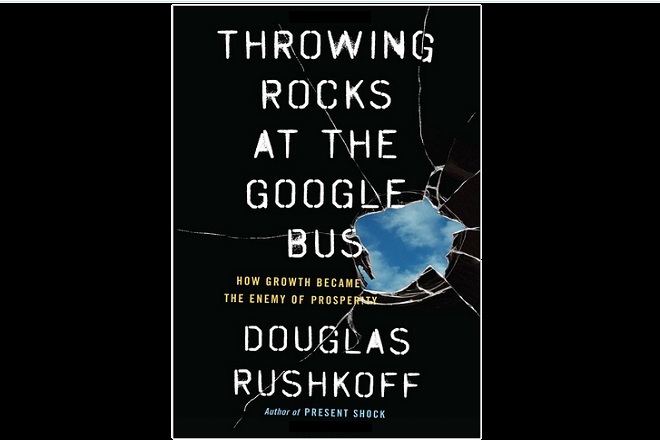Throwing rocks at the Google Bus, the Rushkoff way

Mar 29, 2016 (LBO) - In his latest book 'Throwing Rocks at the Google Bus,' media theorist Douglas Rushkoff argues that the free market isn't written in stone and a path to a more resilient way of doing business involves understanding the steady-state economy.
He reminds us to stop using the market as an excuse for society's ills -- the market was created, and it can change.
"All I ask is that people at the very least acknowledge that the venture capital/startup/financially-driven operating system is a choice, not a preexisting condition of nature."
"The market is a construction. God didn't make the market."
Rushkoff argues that growth has become an end in itself, the engine of the economy, and human beings have come to be understood as impediments to its functioning
This growth is primarily driven by continuous development of new technologies and the opening up of new markets. But can these trends continue?
Although some of these arguments may not apply to Sri Lanka, as we have not fully developed our markets, the likelihood that markets saturate may be relevant to the political economy.
Rushkoff says: "This is one of the primary legacies of the industrial age, when the miraculous efficiency of machines appear to offer us a path to infinite growth -- at least to the extent that human interference could be minimized."
Rushkoff is not the first to rethink the simplicity that markets are perfect, all externalities are priced in, and people are driven by rational motives. That capital accumulation has become problematic has become a central debate in recent years -- a feature built into the current neoliberal model.
A new way of economic thinking eschews the occasional startup whose value explodes in favor of what Rushkoff calls the steady-state economy. The one edict that should govern all businesses: "Does this make my customers rich? If I'm making other people wealthy, then I am supporting the ecosystem that will keep my business alive."
Right now, major economies are set up to ask the entire opposite question: Does this make our investors rich? Instead of valuing and rewarding the creation of a sustainable economy, we value growth above all other things.
Venture capital infuses companies with enough cash that they can expand astronomically and make their founders incredibly wealthy. Look at Twitter, currently besieged by open letters about how to improve its business as its stock tanks.
This is the prime example of an economy with the wrong priorities—and the mistakes founders can make by giving into a mindset that growth is the only meaningful goal of business.
"Their $500-million a quarter in revenue company is considered a failure by Wall Street. If you make $2 billion a year on 140-character messages, that is such a home run," he says.
Instead, stock holders are demanding more growth, in order to increase the stock price so they can sell; they're not interested in owning part of a company whose technology has been the underpinning of so much global change, they're interested in making a profit on the market.
"Technology is making us work harder and we earn less. It's not going well."
Twitter is just one company, but multiply this attitude across the entire economy and things get scary: To continue growing at a rate that will satisfy their investors, companies are forced to find more and more extractive modes of generating revenue.
"This is why you see Bernie Sanders and Donald Trump alike rising. People are doubly disillusioned. Technology is making us work harder and we earn less. It's not going well. ...But then the double anger is that these companies rose on the pretense of being on our side," says Rushkoff.
It seems theory is being re-written along with economic philosophy.
And to do that requires rejecting the idea that the market is a rule of nature that can't be changed.
CEOs need to find ways to operate their company without acquiescing to shareholder demand for constant growth. You (and Milton Friedman) might argue that that is, in fact, the only thing a company should be doing, but in making that argument, you're buying into a system that doesn't need to exist the way it currently: "You can't ignore the development of the modern marketplace.
The rules, Rushkoff argues, were made not by God, but by aristocrats around the 11th century, intent on preventing the peasants from creating a vibrant economy not controlled by the ruling class. Today, the rules can be whatever we want them to be. Rushkoff doesn't want a revolution, just a rethinking. "They worked really well for 700 years of colonial expansion," he says, "but they could use a tweak or two."
He writes in the book that CEOs he talks to are exhausted by being forced into the short term thinking of quarterly growth, and says that as people are reading the book, they're relieved, because the solutions within give them a path to a better business model: "I'm getting emails from CEOs from Fortune 50-sized companies saying, 'I can use this, it's going to work.'
Because these CEOs have been looking for ways to reconfigure to this slow-growth, new normal economy that we're actually in without getting fired or sued."
So just remember, human beings made this system, and human beings can change it. And one thing we all can agree on is that the system isn't working: "Big business and small business, extreme libertarians and Bernie Sanders people all are looking toward the same solution. … We're realizing that we don't really care about our ideologies as much as about the fact that we've let a system get out of control."
A review of Rushkoff's book can be found here
